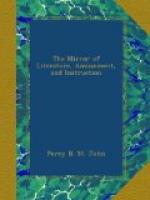A countryman was seized with the most excruciating pain in his stomach, and which continued for so long a period, that his case became desperate, and his life was even despaired of. In this predicament, the medical gentleman to whom he applied administered to him a most violent emetic, and the result was the ejection of the larva, and which remained alive for a quarter of an hour after its expulsion. Upon questioning the man as to how it was likely that the insect got into his stomach, he stated that he was exceedingly fond of watercresses, and often gathered and eat them, and, possibly, without taking due care, in freeing them from any aquatic insects they might hold. He was also in the frequent habit of lying down and drinking the water of any clear rivulet when he was thirsty; and thus, in any of these ways, the insect, in its smaller state, might have been swallowed, and remained gradually increasing in size until it was ready for the change into the beetle state; at times, probably, preying upon the inner coat of the stomach, and thus producing the severe pains complained of by the sufferer.
We are surprised we do not hear more of the effects of swallowing the eggs or larva of insects, along with raw salads of different kinds. We would strongly recommend all families who can afford it, to keep in their sculleries a cistern of salt water, or, if they will take the trouble of renewing it frequently, of lime and water; and to have all vegetables to be used raw, first plunged in this cistern for a minute, and then washed in pure fresh water.—Gardener’s Magazine.
Insects on Trees.
Mr. Johnson, of Great Totham, is of opinion that smearing trees with oil, to destroy insects on them, injures the vegetation, and is not a certain remedy. He recommends scrubbing the trunks and branches of the trees every second year, with a hard brush dipped in strong brine of common salt. This effectually destroys insects of all kinds, and moss; and the stimulating influence of the application and friction is very beneficial.
Manna.
The manna of the larch is thus procured:—About the month of June, when the sap of the tree is most luxuriant, it produces small white drops, of a sweet glutinous matter, like Calabrian manna, which are collected by the peasants early in the morning before the sun dissipates them.—Med. Bot.
Electricity on Plants.
It is very easy to kill plants by means of electricity. A very small shock, according to Cavallo, sent through the stem of a balsam, is sufficient to destroy it. A few minutes after the passage of the shock, the plant droops, the leaves and branches become flaccid, and its life ceases. A small Leyden phial, containing six or eight square inches of coated surface, is generally sufficient for this purpose, which may even be effected by means of strong sparks from the prime conductor of a large electrical machine. The charge by which these destructive effects are produced, is probably too inconsiderable to burst the vessels of the plant, or to occasion any material derangement of its organization; and, accordingly, it is not found, on minute examination of a plant thus killed by electricity, that either the internal vessels or any other parts have sustained perceptible injury.




